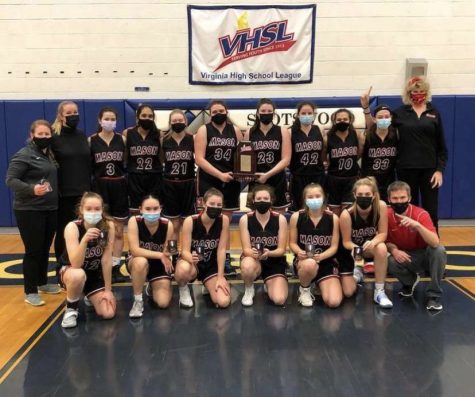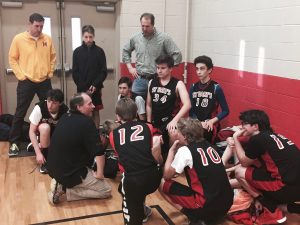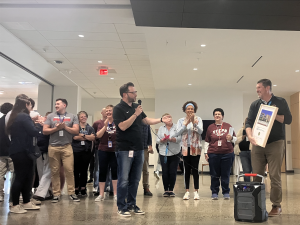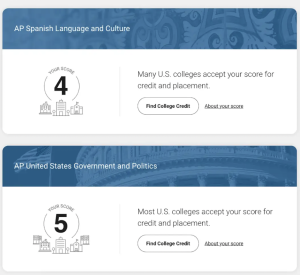“Lady Mustangs” needs to be retired
March 5, 2021

Lady Mustangs. It’s a phrase I’ve heard countless times while living in Falls Church, and I didn’t think much of it until recently.
Basketball, lacrosse, swim and dive, cross country, track and field, soccer: all sports which have both girls and boys teams at Mason, meaning they have to be differentiated sometimes.
Formally, the teams themselves are described as “boys” or “girls.” But when it comes to mascots, female athletes are frequently called “Lady Mustangs,” while male athletes are only ever referred to as “Mustangs.”
Even the city’s recent proclamation, which was designed to commend the varsity girls basketball team for winning the Class 3 State Championship and establish March 5, 2021 as “State Champions Lady Mustang Basketball Day,” referred to the team as the “Lady Mustangs” five times, as well as referenced the “Lady Mustang Cheer squad.”
In 2021, after centuries of global equal rights movements, why is our community still using language which makes the boys’ teams seem like the default?
George Mason High School was founded in 1952, which was a time where girls sports teams were rare. According to GMHS’s Hall of Fame, only two girls sports were offered in 1955: basketball and softball.
Just because we’ve referred to the girls teams in this manner for almost 70 years does not make it acceptable. No one gender should be considered the norm or baseline, and changing the terminology we use regarding it is long overdue.
Focusing on this wording is neither nit-picky nor hypersensitive. The names we choose to give our peers represent all the respect and honor we hold for them. Names truly do matter.
Junior Maeve Dodge, a guard on the varsity girls’ basketball team, agreed that the nickname is harmful, but said she has embraced it in spite of its negative implications.
“Yeah, it’s frustrating when male/female sports are constantly compared to one another, and there’s an unbelievable amount of misogyny, social and institutional, within the athletic community,” Dodge said. “But we just want people to make sure they don’t forget who actually won the state championship: Lady Stangs.”
On Twitter, the girls basketball teams go by the username @GMLadyMustangs.
“It’s not lesser to be ladies,” junior guard Bella Paradiso said. “We are successful and [we] dominate as ladies.”
It’s true. The varsity girls basketball team dominated the season as they finished 16-0, winning games with an average lead of 31 points, and won the titles of the Northwestern District, Region 3B, and Class 3 State Champions.
These student-athletes are deserving of the utmost respect, which is certainly associated with terms like “lady” or “gentleperson.” However, by only adding this term to represent the girls’ teams, it creates a division between genders and disassociates female athletes from their school.
This isn’t just an issue at Mason. At other high schools and colleges around the country, women sports teams are colloquially referred to with “lady” before their mascot’s name. In some specific cases, the school will actually endorse the nickname, such as the “Lady Vols” at the University of Tennessee.
Still, the widespread nature of the problem isn’t an excuse for our community to continue to disrespect its female athletes. Not removing this phrase from our collective vocabulary would only reflect poorly on our school community and its values.
“It’s annoying that all the announcers and press have to add the ‘lady’ every time they reference us,” junior guard Zoraida Icabalceta said. “There’s no point. Just say ‘Mustangs.’”
The girls basketball team, as well as every outstanding student-athlete at Mason — regardless of gender identity — deserve to be called by what they are: Mustangs.









Jennifer Ruane Akins • Mar 16, 2021 at 7:45 AM
Stella is right about our slang “lady mustangs”. I think we should retire the name..
We are all MUSTANGS!
Becca • Mar 12, 2021 at 11:23 AM
Good point, Stella. Unlike some other animal names (e.g. stallion/mare) which imply gender, “Mustang” simply is the word for a wild horse and has nothing to do with gender (on that point, kudos to the people who originally chose Mustangs as the school mascot). Identifying language which creates a subtle (and sometimes, not so subtle) understanding of what is “default” or “normal” can be an important step to improving equality and removing evaluations of “less than” or “second class.” Just this month a major beauty product company said it was removing the word “normal” from describing types of skin and hair for that very reason. There’s nothing wrong with clarifying which team is referenced with “Mustang Women” or “Lady Mustangs” as long as references also consistently are made to “Mustang Men” or “Gentlemen Mustangs.” It’s only a problem when male athletic teams (“Mustangs”) are seen as the norm, the default, and female teams are the “other” (“Lady Mustangs”).